|
High Street
St. Margaret's at Cliffe
https://whatpub.com/hope-inn
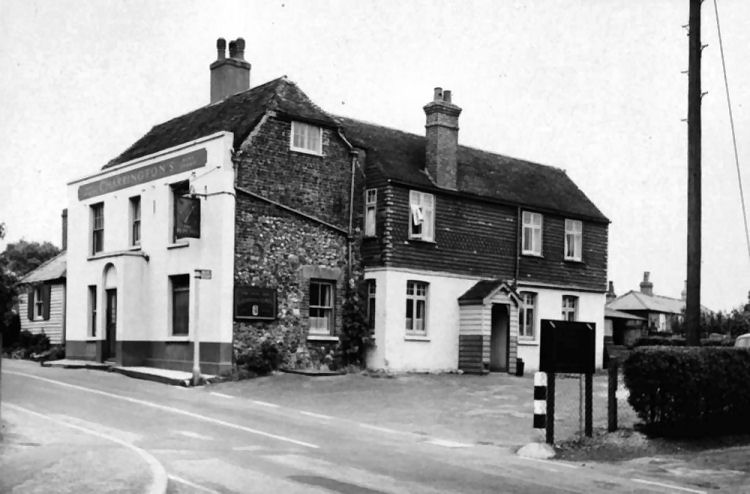
Above photo 1952.
Creative Commons Licence. |
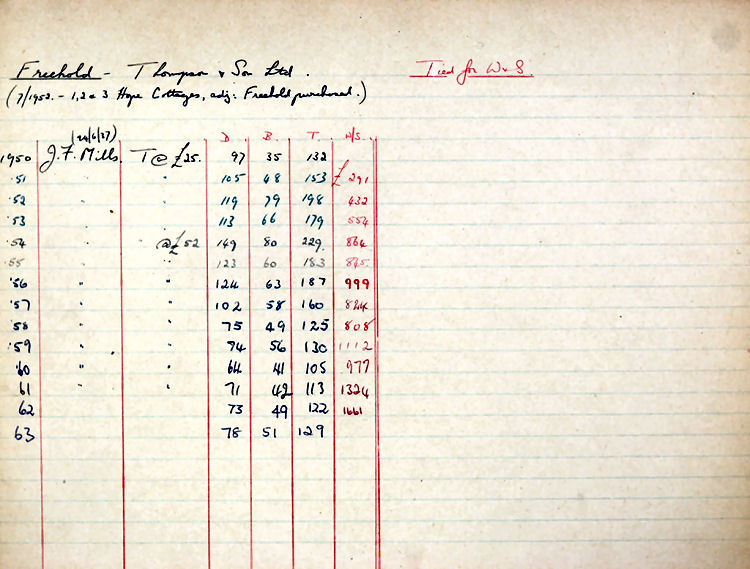
Thompson & Sons ledger.
Creative Commons Licence. |
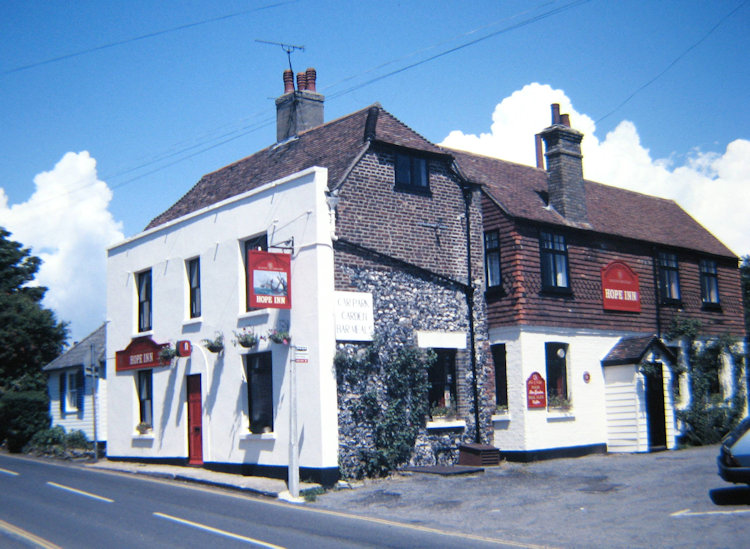
Above photo, 12 June 1986, by Jim Ashby. |
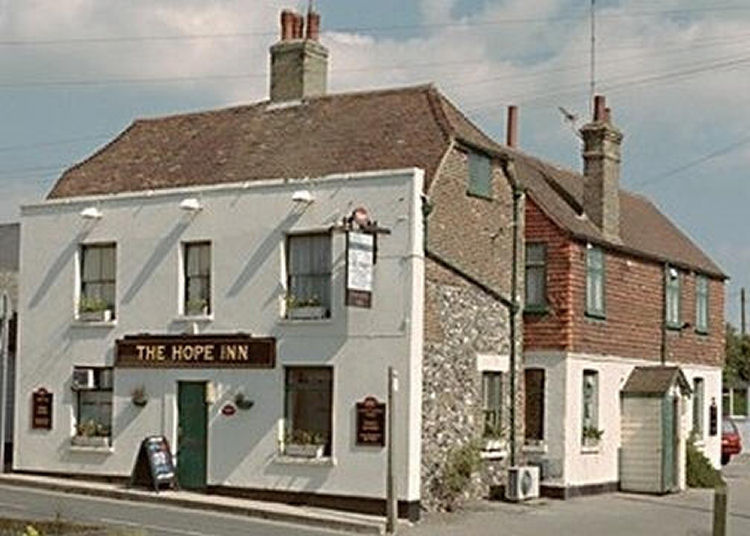
Above photo by Roger Hurst, circa 1990. |
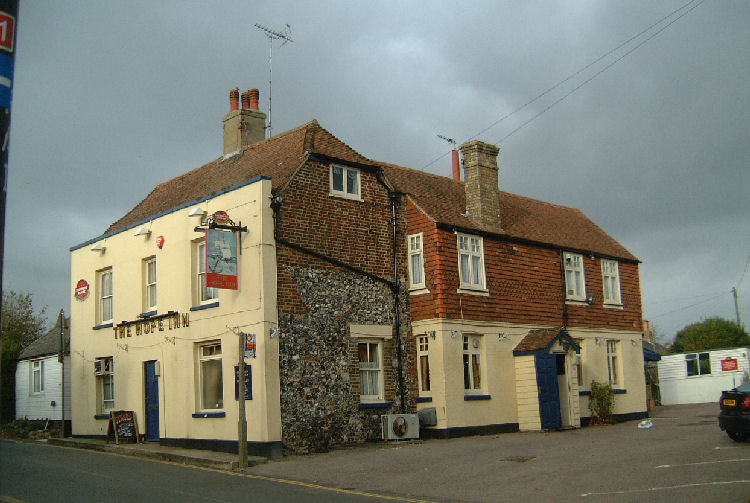
Above photo by Paul Skelton. |
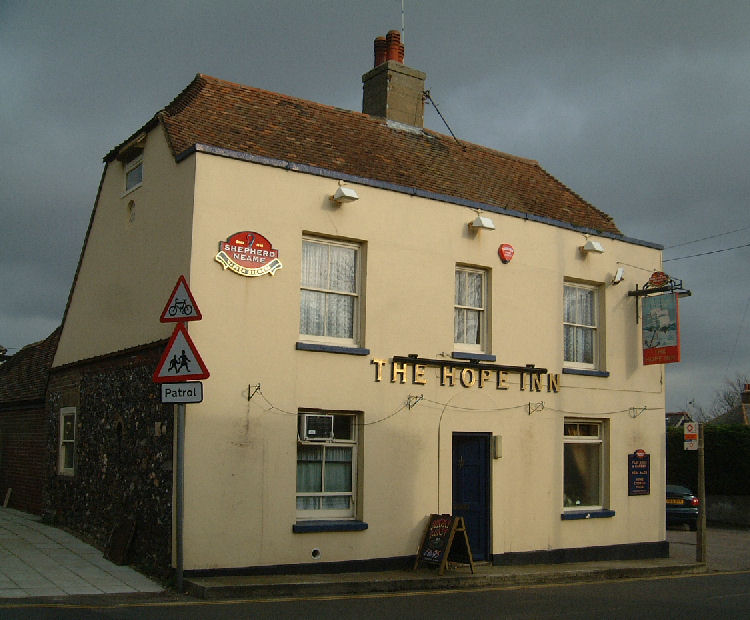
Above photo by Paul Skelton. |
|
|
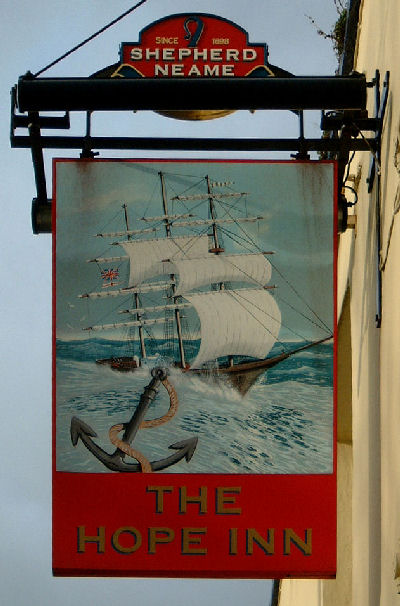 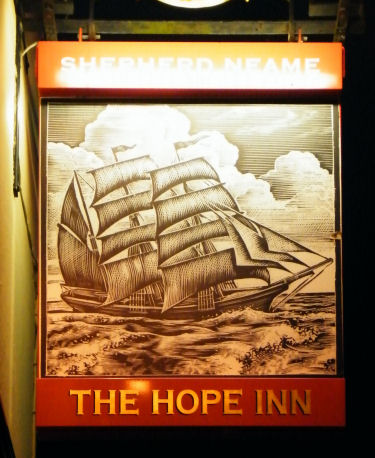 |
|
Above photos by Paul Skelton
Left 10 November 2007.
Right 26 November 2011. |
The Hope at St. Margaret's at cliff is the only remaining pub in the village
that still has a skittle alley.
Part of the building is made from flint.
|
From the Dover Express and East Kent Intelligencer,
1 February, 1867.
REMANDED CHARGES
Joseph Bell and Bartholomew James, privates in the 70th Regiment, and
Andrew Shaw, a trumpeter belonging to the 13th Brigade Royal Artillery,
were again placed at the bar on the charge of robbery and violence brief
particulars of which have already been given.
Mr. Lewis now appeared for the prisoner Bell.
Elizabeth, wife of Thomas Powell: I live at St. Margaret's, where I
keep a little shop. I recognise the prisoners as three young men who
came into my shop of Friday afternoon, between two and three o'clock.
They purchased half a loaf of bread and a piece of cheese, and
afterwards left the shop. When they came into the shop a whole Dutch
cheese was standing on the counter, and immediately they had left I
missed it. After the prisoner left my shop I saw them go into the "Hope"
public-house, which is a very little way off. The value of the cheese is
2s. 6d. I informed my husband of the circumstance as soon as he entered
the house - in about a quarter of an hour after the occurrence.
By the prisoner James: I cannot say which of you took the cheese.
None of you returned to the shop.
John Chapman: I live at Swingate, in the parish of Guston, and am a
bricklayer. I saw the prisoner Bell on the turnpike road, near Swingate,
coming from the direction of Westcliff and St. Margaret's with a cheese
under his arm. He was alone, and was walking at a brisk rate towards
Dover. Mr. Powell shortly afterwards came up, and told me a cheese had
been stolen from his shop. I thereupon pursued the prisoner, who, on
seeing that I was following him, ran away. He fell down while crossing a
field, and I saw the cheese roll from under his coat. He got up and ran
away, and I shortly afterwards caught him, and conveyed him to the "Swingate
Inn," where he was taken in charge by the parish constable. I picked up
the cheese and gave it to the constable.
By Mr. Lewis: The prisoner (Bell) was not in liquor.
Mr. Lewis: What made him fall down in the field?
Witness: I don't know, it was heavy running.
Cross-examination continued: The field was not far from the spot
where I first saw the prisoner. I took him about a hundred yards from
the place where he dropped the cheese. The cheese produced is the same.
Thomas Powell, the husband of the first witness: On Friday afternoon,
in consequence of what was told me by my wife, I went after three
soldiers, overtook them on the road between Westcliff and Swingate. I
saw a young woman coming towards them, and as soon as they got to her
they "tackled" her. They dragged her into a field. As I passed them the
young woman was crying out for assistance. I did not stop them to assist
her, as I knew there was other help at hand. I should have stopped if I
had not known that. About ten minutes afterwards I saw Bell coming along
the road. I told the last witness (John Chapman), and he ran after him
and detained him. I saw Bell drop the cheese from under his coat. He was
afterwards handed over to the parish constable. The two other men ran
away across a field.
By the Bench: The cheese, I am sure, is my property. I asked the
prisoner where he had got the cheese, and he said it belonged to "a man
in the country." (Laughter.)
William Marsh, parish constable of Westcliff: I was at the parish
church about three on Friday afternoon last, when I saw the prisoner
pass. They were going towards Swingate. A few minutes afterwards Pascall
came to me, and in consequence of what he told me I followed the
prisoners. When I arrived at Swingate Bell was in custody of Chapman and
Powell. I handcuffed the prisoner, and brought him towards Dover, but on
our getting near the Castle Fort, he made his escape. I went in search
of him at the barracks, and there saw the two other prisoners, who were
placed in confinement for the night in consequence of my representations
that they had been concerned in robbing a shop in St. Margaret's and in
stopping a young woman on the road between that place and Dover. I saw
the other prisoner in Snargate Street on Saturday evening, and he was
then apprehended.
This was the whole of the evidence in the charge of felony; but the
Magistrates determined to her the testimony of the other case before
giving their decision.
The following witnesses were then examined:-
Alice Batcheller, a respectable-looking young woman, said: I am a
single woman, and reside at 10, Model Cottages, Dover. On Friady
afternoon last, shortly after three o'clock, I was on my way from Dover
to St. Margaret's, when I met the three prisoners. I was going to St.
Margaret's to make enquiries about a situation. I was walking along a
path which crossed a ploughed field, when the prisoners came up to me. I
am sure of their identity. They all kissed me. Two of them (Shaw and
Bell) threw me down and put their hands up my clothes as far as they
could. They knelt upon me, put their hands over my face, and made my
nose bleed. I had one of my hands closed, and they forced it open to see
what I had in it. It contained only my glove. I had a silver thimble in
my pocket, and that is missing. In a little time Bell ran away, and Shaw
said to James "He's got her brooch." While the men were maltreating me
the witness Powell passed me. I could not call out, as the prisoners had
their hands over my mouth. After Bell ran away the other two men made
their escape. Very soon afterwards a man came to my assistance, and I
told him what had been done to me. I also told the parish constable, and
Mrs. George, a woman living in St. Margaret's whom I know.
By Mr. Lewis; I have not seen the brooch since I did not look about
the field for it, - I was too much frightened.
By James: Shaw and Bell put their hands up my petticoats. You placed
your hand over my mouth, and made my nose bleed. You did not pick me up.
I was on the path when you met me, and you dragged me into the field. I
cannot say how far I was dragged into the field, but not far. I could
not call out because your hands were over my mouth. I did not say on
Saturday that the reason I did not holloa was because I could not see
any one who could come to my assistance. I asked you to let me go, and
one of you replied "There's no fear of that."
By Shaw: I am positive as to your identity.
The parish constable Marsh said he found the prosecutrix in the field
she had described, cleaning the mud from her dress. She was standing
about half a rod from the path. She told him three soldiers had been
interrupting her. She said they had torn her clothes and had stolen her
brooch. He observed some blood on her face. She appeared greatly
agitated and distressed. Another man was upon the spot, and witness left
her in his charge and pursued bell, whom he apprehended.
The witness Powell was also called and he repeated portions of the
evidence he had already given. He saw the three prisoners seize hold of
the prosecutrix and drag her into the field. He saw the soldiers pulling
her about, but did not see her upon the ground. He had the parties in
view four or five minutes. He heard the prosecutrix keep telling the
soldiers to leave her alone and let her go. The prosecutrix seemed much
afraid. Witness went forward and sent a man to the girl's protection.
By James: The reason I did not stop to protect the prosecutrix myself
was because I was going after a policeman. I did not look at you and
laugh.
This being the whole of the evidence, the Magistrates in reply to Mr.
Lewis, said they had resolved to commit the prisoner for trial on both
charges.
The prisoners who had no defence to make, were fully committed to
trial at the East Kent Sessions.
|
|
From the Whitstable Times, 24 August, 1900.
ST MARGARET'S AT CLIFF.
A CLIFF MYSTERY - SUPPOSED SUICIDE.
The East Kent Coroner (R. M. Mercer, Esq.) held an inquest on Friday at
the "Hope Inn," St. Margaret's near Dover, on the body of an unknown
woman.
George Hunt, a paper merchant, staying at 24, Marine Parade, Dover,
deposed that on the 23rd August at 12 noon he was walking along the
beach by Langdon Stairs, St. Margaret’s. he saw the body of the woman
viewed by the jury lying by the high water mark face downwards, the face
being partially buried in the beach. Having his little boy with him he
took him quietly away to the Coastguard Station where he gave
information. he could see she was quite dead. The tide had gone down two
hours. her hair lay spread on the beach and there was a good deal of
seaweed all around her. She was quite unknown to him.
P.C. Sanders, near Langdon stated that he was at the Coatguard Station,
near Langdon, bathing, at 12.10, when he was informed there was a body
on the beach. He found a lady's hat, pair of kid gloves, two
pocket-handkerchiefs, one marked "H.L.R.," the other was unmarked, two
tortoiseshell combs, and a hat pin with a silver knot. The maker of the
hat was David Farn and Co., 474, Oxford Street, W., and the gloves E. L.
Parsome, 8, High Street, Streatham. He then went to the body and
searched it and found 2s. 6d. and a gold brooch. The body was removed.
The length of it was 5ft 6in. The hair was black and eyes dark hazel.
The mouth contained a set of false teeth, there being only six on the
upper jaw. There was a large wound on the top of the head and two more
on top of the head. There was a public footpath along the top of the
cliff. The hat lay in the path and the gloves lay neatly pulled out by
the hat. The two combs lay close by. The cliff was 250 to 300 feet high.
There were no marks of a struggle on the cliff. Deceased's age was
between 25 and 30.
The jury returned a verdict that deceased fell over the cliff, but how
there was not sufficient evidence to show.
On Saturday evening the body of the deceased was identified by her
father, who is a Dane, as Harriett Westerman, of 4, Park Villas, Hanwell,
Middlesex. The deceased left home on the 22nd August, and had lately
acted rather strangely. She was only 18 years of age. A paragraph in a
London paper induced Mr. Weaterman to make enquiries which led the
identification of the unfortunate girl.
|
|
From the Deal, Walmer, and Sandwich Mercury,
1 September, 1900. 1d.
A GIRL FOUND OVER THE CLIFFS AT ST MARGARET'S
A very mysterious case was last week reported to the police of Dover
and St. Margaret's. On Thursday, about noon, a visitor to Dover, whilst
walking at the foot of the cliffs between Dover and St. Margaret's, saw
the dead body of a woman, surrounded by seaweed, the head being
partially buried in stones. The coastguard and the police at St.
Margaret's were informed, the body being eventually removed to St.
Margaret's. Mr. R. M. Mercer, the East Kent coroner, held the inquest at
the "Hope," St. Margaret's, on Friday evening, and an open verdict was
returned.
On Saturday evening, the body of the deceased was identified by her
father, who is a Dane, as Harriet Westerman, of 4, Park Villas, Hanwell,
Middlesex. The deceased left home on the 22nd August, and had lately
acted rather strangely. She was only 18 years of age. A paragraph in a
London paper induced Mr. Westerman to make the inquiries which led to
the identification of the unfortunate girl.
|
|
From the Dover Express and East Kent News, Friday
18 April, 1902. Price 1d.
ASSAULT AT ST. MARGARET'S
John Aldridge, a hawker, of bridge Street, Dover, was summoned for
assaulting Morris Drew, landlord of the "Hope Inn," St. Margaret's , on
the 29th ult. Mr. Rutley Mowll appeared for the complainant. The
evidence was to the effect that the man was drunk, he having had 19
pints of beer during the day. The defendant was fined 40/- and 25/-
costs.
|
|
From the Dover Express and East Kent News, Friday 17 August, 1906. Price 1d.
LICENSING
An occasional licence was granted to Mr. Drew of the “Hope Inn,” St.
Margaret's, for the annual sports at Reach Court Meadow.
|
|
From the Dover Express. 1909.
Big Fire at St. Margaret's.
Hope Inn Burnt Out.
This afternoon at about 2.30, the Hope Inn St. Margaret's, kept by Mr.
Morris Drew, caught fire. The St. Margaret's brigade was quickly on the
spot but the flames continued to gain and there is little chance of the
house being saved. The Dover brigade was telegraphed for and left
promptly at 3.20 in charge of Inspector Scutt. A message received from
St. Margaret's at 3.30, states that the local brigade has now completely
got the fire under. The house is particularly gutted although the roof,
which is burnt through, has not fallen in. The St. Margaret's brigade
used the double standpipe for the first time and it proved very useful.
The adjoining cottage was in danger for some time and is damaged by
water. The cause of the fire has not yet been properly ascertained, but
it is stated that Mr. Drew, who is by himself in the house today, his
wife and family being away on a visit, upset a lamp in the linen room.
The journey of the Dover Fire Brigade will be useless one under the
circumstances, but they cannot be recalled.
Information kindly supplied by Joyce Banks.
The St. Margarets Fire. 1909.
It is estimated that quite £250 worth of damage was done to the Hope
Inn, St. Margaret's, by the fire, which occurred there last Friday
afternoon. It appears that Mr. Morris Drew, the landlord, was engaged
about 2.15 in the afternoon in replenishing the lamps and, filling the
one in the bar, replaced it upon the hook in the ceiling. He went into
the taproom and shortly afterwards heard an explosion. On returning to
the bar he found the place filled with smoke and the woodwork round by
the fireplace, which is behind the counter, well alight. The hook in the
ceiling had pulled right out, the lamp being smashed in its fall, and,
it is surmised, as it had not been lighted that the paraffin splashed
into the fire and caught alight. The chimney, which was one of the old
fashioned sort, was boarded round with match-boarding and this being very
dry readily burst into flames. Mr. Drew raised the alarm, informing Mr.
L. Newman of Dora Cottage who, together with Mr. Hogbin obtained the
hose reel from Mr. Clayson's house opposite. Other willing helpers soon
on the spot included Mr. Atwood, Mr. E. Atwood, Mr. Doubleday and Mr.
Houghties. The bar window facing the Morley House was smashed and a
strong stream of water directed on the flames. Meanwhile, Mr. Clayson,
captain of the St. Margaret's Fire Brigade, who was working at West
Cliffe, was sent for and the other members of the brigade were quickly
assembled. The double standpipe was put on in place of the other and
proved very serviceable, a good supply of water being directed into the
bar and into the upper part of the house through the window. A large
quantity of spirits on shelves in the bar and behind the chimney fell
prey to the flames causing the fire to burn even more fiercely. The
flames spread right through to the next floor, extensively damaging the
front bedroom which was just over the bar, the back attic and finally
burning through the roof making a large hole. The floor of a small box
room was also burnt through. Much damage was also done in the house by
water, particularly in the living room, where a glare could be seen.
Some difficulty was experienced by the firemen in locating the fire in
the upper part of the building owing to the dense and suffocating smoke
and the way in which the flames worked up by the side and behind the
chimney. During the progress of the fire Mr. Drew thought of his canary
which was hanging in the living room and breaking the window pane
succeeded in pulling the cage through. Later, Mr. Drew climbed into the
window of an upstairs room by means of a ladder and secured a box
containing money and other valuables. The fire was ultimately got under
at about 4.15. The Dover Fire Brigade, which had been sent for, arrived
just before four o'clock but their services were not required. The St.
Margaret's Fire Brigade consists of the following:- Messrs. T. Clayson
(captain), E. Drew, Gillings, T. Clayson, E. Clayson, C. Wickaden, A.
Kenway and I. Pay. Although business is still being carried on, a bar
made in the taproom which escaped damage, Mr. and Mrs. Drew have been
obliged to take apartments close by.
The property and furniture are insured in the Guardian Office (agent
Messrs. Worsfold and Hayward, Dover).
|
|
From the Dover Express and East Kent News, 29 September 1939.
The "Hope" Inn, St. Margaret's, was granted an occasional license for
stock sales at Reach Court Farm, St. Margaret's, on 5th October.
|
|
From the Dover Express. 17 April, 1970.
Inn takes a beating.
Several square feet of flooring was damaged by fire at the "Hope
Inn," St Margaret's, on Sunday night. The blaze was caused by hot coal
from a domestic fire setting fire to an armchair.
Fireman had to cut away part of the floor to ensure that the fire was
out. The armchair was also damaged.
|
|
From the Dover Express. 2 October, 1970.
Retiring soon.
What most attracts you to your local? The beer? A game of darts or
dominoes? The blond on the bar?
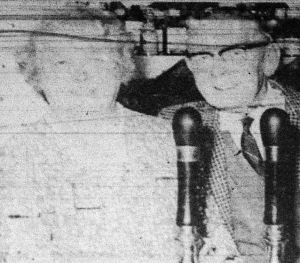 Well,
whatever your reason one of the main features that enhance the
atmosphere of a pub is a chat with a friendly landlord. Well,
whatever your reason one of the main features that enhance the
atmosphere of a pub is a chat with a friendly landlord.
So you can appreciate many people in St. Margaret's will miss the
friendship of Mr. Jim Mills who in November will be retiring as landlord
of the "Hope Inn," St Margaret's after 33 years behind the bar.
"And I've enjoyed every minute of it," says Mr. Mills.
Seventy two year old Mr. Mills first met his wife Lill in a pub in
Portsmouth where she was a barmaid.
"I think it was love at first sight for both of us," recalls Mr.
Mills.
Now Mr. and Mrs. Mills have five children, ten grand children and two
great grand children.
"How has pub life altered since he became licensee of the "Hope Inn,"
all those years ago.
"The most memorable change has been in prices. When I first started
you could get a drink and a great meal for about six pence," said Mr.
Mills.
Charrington the brewers are arranging a farewell get together for Mr.
Mills and his wife in November. There should be quite a few residents of
St. Margaret's wanting to say "thank you" to them.
"Cheers from us, Mr. and Mrs. Mills."
|
Currently shut and boarded up. May 2014.
Shepherd Neame did have the Leasehold for sale but are now selling the freehold
for £400,000.
|
From the Dover Express, 5 March 2015.
Plans for inn.
How the owners of the now-closed Hope Inn hope to convert the 18th century
listed property is revealed in a planning application.
Sam Buckley seeks to convert the former pub into two dwellings while
proposing to put up four residential units within the grounds where
there used to be car parking and a beer garden.
|
LICENSEE LIST
DIXON Thomas 1861+ (also blacksmith age 38 in 1861 ) )
HILLS Edmund 1871-81+ (age 56 in 1881 ) )
FAGG Richard 1874-91+ (age 47 in 1891 ) )
     
THURLOW Robert 1891+ (age 61 in 1891 ) )
CLARINGBOULD Thomas 1895-97 
SUMMERS Frederick W 1901+ (age 47 in 1901 ) )
DREW Morris 1898-1911+
(age 48 in 1911 ) )
      
HISCOCK Walter 1913-32+
     
BETTNEY Charles F W to Apr/1932

TAPLEY Daniel Herbert Apr/1932+

HOYLE William Ambrose to Jun/1937

MILLS James Frederick 24/Jun/1937-Nov/70
     
GRIGGS James H 1974+
 Charrington & Co
Charrington & Co
ERWIN N 2002
PERRY Fred 2003-2008
VAUGHAN Mrs M 2009-July/11
 BROWN Tim July/2011+
BROWN Tim July/2011+
https://pubwiki.co.uk/HopeInn.shtml
 Census Census
 From the Post Office Directory 1874 From the Post Office Directory 1874
 From the Post Office Directory 1882 From the Post Office Directory 1882
 From Pikes Dover Blue Book 1889 From Pikes Dover Blue Book 1889
 From Pikes Dover Blue Book 1890 From Pikes Dover Blue Book 1890
 From Pikes Dover Blue Book 1891 From Pikes Dover Blue Book 1891
 From the Post Office Directory 1891 From the Post Office Directory 1891
 From Pikes Dover Blue Book 1895 From Pikes Dover Blue Book 1895
 From Pikes Dover Blue Book 1896-97 From Pikes Dover Blue Book 1896-97
 From Pikes Dover Blue Book 1898 From Pikes Dover Blue Book 1898
 From Pikes Dover Blue Book 1899 From Pikes Dover Blue Book 1899
 From Pikes Dover Blue Book 1899-1900 From Pikes Dover Blue Book 1899-1900
 From the Post Office Directory 1901 From the Post Office Directory 1901
 From the Post Office Directory 1903 From the Post Office Directory 1903
 From the Kelly's Directory 1903 From the Kelly's Directory 1903
 From Pikes Dover Blue Book 1909 From Pikes Dover Blue Book 1909
 From the Post Office Directory 1913 From the Post Office Directory 1913
 From the Post Office Directory 1914 From the Post Office Directory 1914
 From the Post Office Directory 1922 From the Post Office Directory 1922
 From Pikes Dover Blue Book 1924 From Pikes Dover Blue Book 1924
 From the Post Office Directory 1930 From the Post Office Directory 1930
 From Pikes Dover Blue Book 1932-33 From Pikes Dover Blue Book 1932-33
 From Pikes Dover Blue Book 1938-39 From Pikes Dover Blue Book 1938-39
 From the Kelly's Directory 1950 From the Kelly's Directory 1950
 From the Kelly's Directory 1953 From the Kelly's Directory 1953
 From the Kelly's Directory 1956 From the Kelly's Directory 1956
 Library archives 1974 Library archives 1974
 From the Dover Express From the Dover Express
|








 Well,
whatever your reason one of the main features that enhance the
atmosphere of a pub is a chat with a friendly landlord.
Well,
whatever your reason one of the main features that enhance the
atmosphere of a pub is a chat with a friendly landlord.